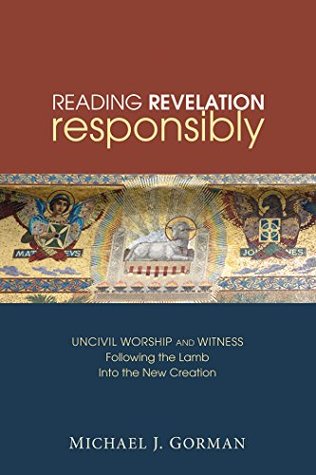More on this book
Community
Kindle Notes & Highlights
Reading Revelation Responsibly: Uncivil Worship and Witness: Followingthe Lamb into the New Creation
Read between
April 23 - July 25, 2020
Furthermore, although Scripture is a living word from God that can bring a fresh message to people in changing contexts, with respect to Revelation it must be clearly stated that some readings are not only inferior to others, they are in fact unchristian and unhealthy.
As a biblical scholar who strives to interpret Scripture theologically and missionally, I do not find it appropriate to separate exegesis (analysis of the historical and literary aspects of the text) from theological reflection or application.
it is the only New Testament book on which Calvin did not write a commentary.
Is it about a particular evil empire—whether past, present, or future—or about evil and empire more generally?
Revelation is (primarily) good news about Christ, the Lamb of God—who shares God’s throne and who is the key to the past, present, and future—and therefore also about uncompromising faithfulness leading to undying hope, even in the midst of unrelenting evil and oppressive empire.
“The gospel of Jesus Christ is more political than anyone imagines, but in a way that no one guesses.”
ar from looking for the end of the world, they [Jewish apocalyptic writers] were looking for the end of empire. And far from living under the shadow of an anticipated cosmic dissolution, they looked for the renewal of the earth on which a humane societal life could be renewed.”
the New Testament often portrays God’s act in Christ as an apocalyptic act: the final, decisive battle with the cosmic powers that is an act of judgment on all people and nations but also a liberating “invasion” for all humanity and indeed for the entire cosmos.
It will also encourage us not to take the symbolism “literally,” that is, to think of actual pale-green horses or multi-headed beasts or thousand-year periods. These are all symbolic, but that does not make the realities to which they point any less real.
At the same time, like biblical prophecy, “its goal is not speculative foresight, but theological insight.”
But prophecy, in the biblical tradition, is not exclusively or even primarily about making pronouncements and predictions concerning the future. Rather, prophecy is speaking words of comfort and/or challenge, on behalf of God, to the people of God in their concrete historical situation.
But Richard Bauckham rightly insists that “it is not simply because Rome persecutes Christians that Christians must oppose Rome. Rather it is because Christians must disassociate themselves from the evil of the Roman system that they are likely to suffer persecution.”
But since Revelation is almost certainly not a response to a systematic, state-imposed persecution or widespread mistreatment of Christians by the masses, it is better read as a response to “ordinary empire,”4 to the everyday evils, injustices, and misguided allegiances that are daily with us.
The central and centering vision of Revelation is a vision of God and the Lamb, and specifically of the worship of God and the Lamb.
makes claims about who is truly God and about right and wrong connections between God and the socio-political order; it challenges the political theology of empire and the religious ideology that underwrites it; and it reveals God and the Lamb alone as the true Sovereign One, source of all blessings, and proper object of worship.
namely what many have called nonviolent and non-coercive “Lamb power”—to
[i]n the last twenty years we [in Central America] have experienced the cruel and terrible experience of Whole Market Empire, governed in a beastly way by the political and military bureaucracy of the United States of America. . . . Our countries live in oppression and exclusion by an economic, cultural, and military system of globalization led by the United States government operating as an imperial, arrogant, and cruel power.


